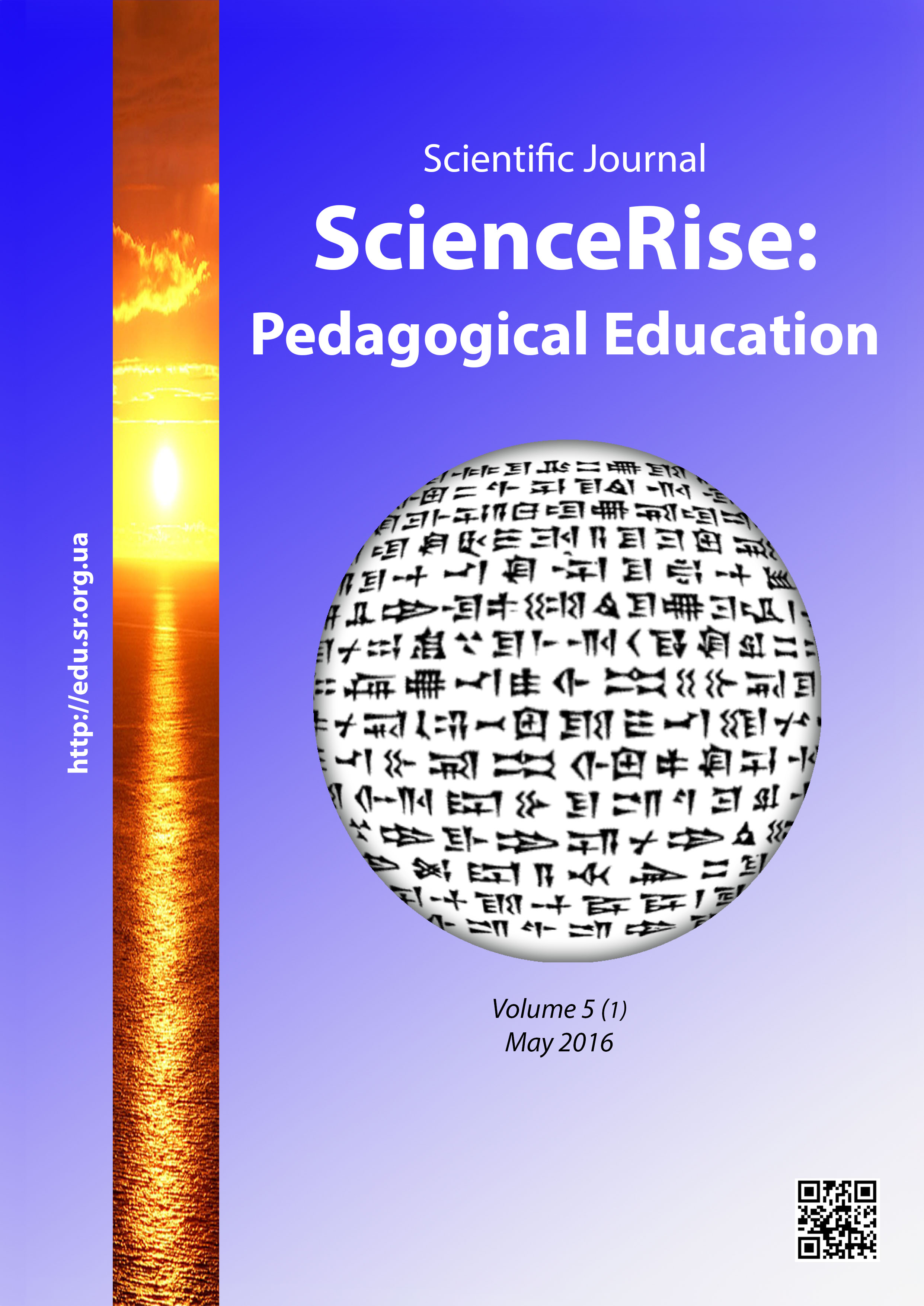Management of the development of comprehensive educational institution: theoretical and practical analysis
DOI:
https://doi.org/10.15587/2519-4984.2016.70213Keywords:
the management of development of general educational institution, regularities, principles, functions, organization of the management structureAbstract
The theoretical and practical analysis of problems of development management of general educational institution is realized in the article. The author has found out contradictions which cause relevance of a problem: new market conditions, formation of the educational market, increase of the competition of educational institutions.
The management of development of general educational institution is defined as technology of realization of strategic objectives of activity (purposes of development of the educational organization, purposes of development of pedagogical personnel generally and each teacher particularly, purposes of development of the child as the main consumer of educational services) which contains: principles of management (value-orientation unity, human resource management, risk management of the educational market, structurally functional principles) regularities of management (social and psychological regularities, regularities of tectonics of management, effective implementation of administrative activity) functions of management(motivational-purposed, information and analytic, function of strategic planning, predictive, advisory, management function, representative, marketing functions) project-matrix organizational structure of management; methods of (positive reinforcement, dialogical coordination, corporate work, creative modeling, positive thinking, strategic planning, SWOT-analysis, PEST- analysis of definition of positive changes in activity of general educational institution) and controlling the mean(delegation of powers and tasks, discussion in collective, information and communication, stimulation of professional growth, encouragement, formation of design groups, creation of the atmosphere of trust and complementarity, social interaction) control (factorial and criteria assessment of effective management of development of general educational institution)References
- Bondar, V. S. (1997). Management activities of the Director of the school: didactic aspect. Kyiv, 156.
- Maslov, V. I. (2007). Scientific basics and functions of the management process of secondary educational institutions. Ternopil: Aston, 7–8.
- Ninuk, I. (2004). Features of the analysis of professionalism of civil servants. Collection of scientific papers NADU, 2, 225–234.
- Vasilenko, V. A., Shmatko, V. G.; Vasilenko, V. A. (Ed.) (2009). Innovation management. Kyiv: Center of educational literature, 440.
- Vashchenko, L. M. (2012). Conceptual bases of organization of educational process for professional development of pedagogical, scientific-pedagogical and managing staff of education in the conditions of innovative development of institutions of postgraduate teacher education. Innovative model of organization of educational process in institutes of postgraduate pedagogical education. Kyiv: Pedagogical thought, 63–68.
- Voznyuk, S. V. (2007). Marketing of educational services. Lutsk: Volinska book, 64.
- El'nikova, G. V. (1999). Scientific bases of development of the Department of General secondary education in the region. Kyiv: of DAKKO, 303.
- Karamushka, L. (1997). Psychological foundations of governance in secondary education. Kyiv: Academy of pedagogical Sciences of Ukraine, Institute of psychology, 179.
- Potashnik, M. M. (1997). Management of modern school (questions and answers). Moscow: New HQ., 350.
- Danilenko, L. I. (2007). Management of innovations in education. Kyiv: SHK. world, 120.
- Averintsev, S. S., Arab-Ogly, E. A., Ilichev, L. F. et. al (Eds.) (1989). Philosophical encyclopedic dictionary. Moscow: Owls. Encyclopedia, 815.
- Novak, V. A. (2001). fundamentals of the theory of management. Kyiv: NAU, 236.
- Nazarenko, V. S., Nazarenko, L. M., Odainik, S. F. (2015). Professional success of the teacher as a socio-pedagogical problem. Chep. 1. Kharkov, 96.
- Mudrak, I. V. (2007). Modern tendencies of development of Ukrainian higher education in the global educational space. Kn. 1. Ukrainian education in the world greenprotective. Kyiv: Ukrainian Agency of press and information "Rada", 362–363.
- Karpov, A. (2005). Century Psychology of management. Moscow: Gardariki, 584.
- Doronina, M. S., Naumych, K. G. (2006). Organizational culture. Kharkov: Publishing House. GNU, 80.
- Chernovol-Tkachenko, G. I. (2014). Equipment management activities. Kharkiv: Type. group "Osnova", 272.
- Valinchuk, Yu. V. (2007). Higher education future human. Kn. 1.Ukrainian education in the world greenprotective. Kyiv: Ukrainian Agency of press and information "Rada", 88–89.
- Dmitrenko, G. A. (1996). Strategic management: trust management-based education qualimetrics approach. Kyiv: SMN, 140.
- Zaichenko, A. I. (2001). Systematic work with senior staff – enhance their professional competence. Quality Management professional education. Donetsk, 333–335.
- Ryabov, S. V. (2011). Marketing research in the management of the school. Theory and methodology of education management, 5. Availavble at: http://tme.umo.edu.ua/
Downloads
Published
How to Cite
Issue
Section
License
Copyright (c) 2016 Людмила Миколаївна Назаренко

This work is licensed under a Creative Commons Attribution 4.0 International License.
Our journal abides by the Creative Commons CC BY copyright rights and permissions for open access journals.
Authors, who are published in this journal, agree to the following conditions:
1. The authors reserve the right to authorship of the work and pass the first publication right of this work to the journal under the terms of a Creative Commons CC BY, which allows others to freely distribute the published research with the obligatory reference to the authors of the original work and the first publication of the work in this journal.
2. The authors have the right to conclude separate supplement agreements that relate to non-exclusive work distribution in the form in which it has been published by the journal (for example, to upload the work to the online storage of the journal or publish it as part of a monograph), provided that the reference to the first publication of the work in this journal is included.








